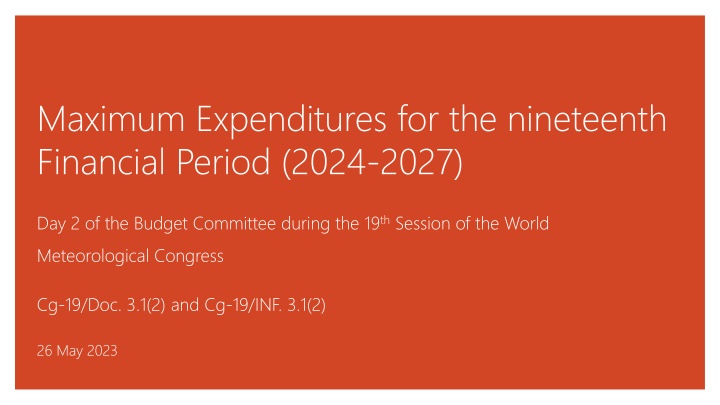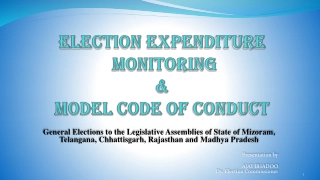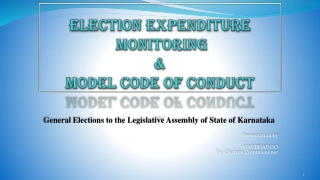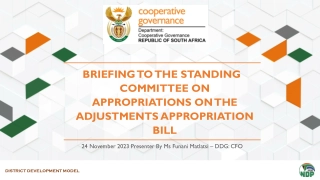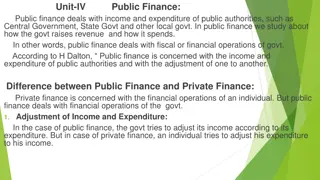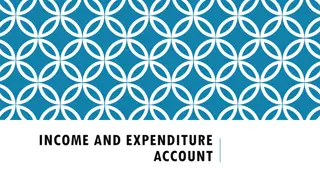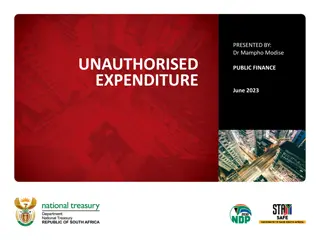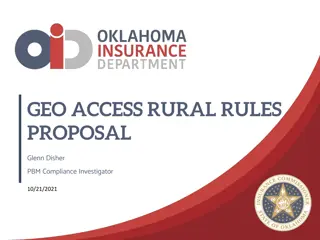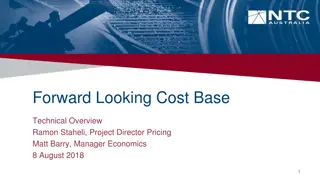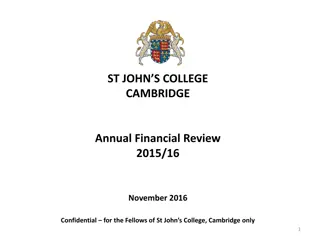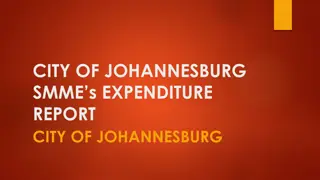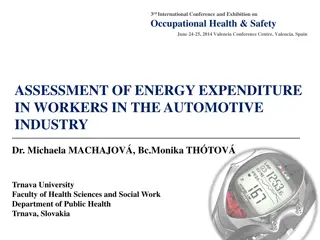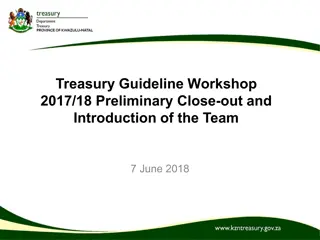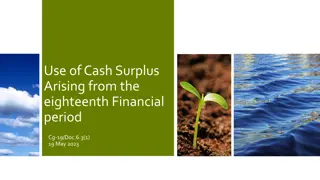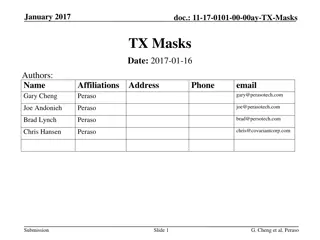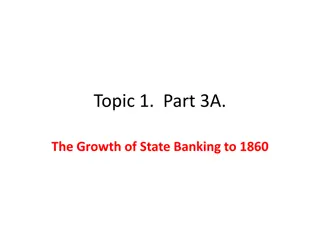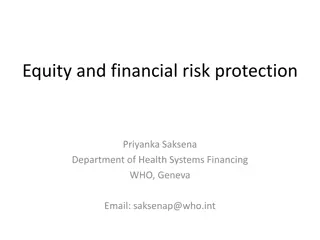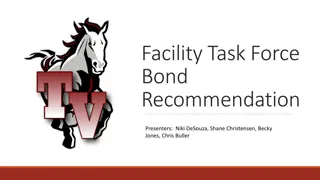Revised Maximum Expenditure Proposal for 19th Financial Period
Consolidated revised proposal for the 19th financial period presented at ZRG level, addressing Budget Committee requests. The proposal includes maintained funding for EW4All, ERP, and IT Strategy, updated prioritizations, removed elements from GGGW Proposal, and considerations for extrabudgetary funding. Baseline budget at ZNG is outlined, detailing the allocations and exclusions in the maximum expenditure.
Download Presentation

Please find below an Image/Link to download the presentation.
The content on the website is provided AS IS for your information and personal use only. It may not be sold, licensed, or shared on other websites without obtaining consent from the author.If you encounter any issues during the download, it is possible that the publisher has removed the file from their server.
You are allowed to download the files provided on this website for personal or commercial use, subject to the condition that they are used lawfully. All files are the property of their respective owners.
The content on the website is provided AS IS for your information and personal use only. It may not be sold, licensed, or shared on other websites without obtaining consent from the author.
E N D
Presentation Transcript
Maximum Expenditures for the nineteenth Financial Period (2024-2027) Day 2 of the Budget Committee during the 19thSession of the World Meteorological Congress Cg-19/Doc. 3.1(2) and Cg-19/INF. 3.1(2) 26 May 2023
Revised Maximum Expenditure Proposal Consolidated Revised Proposal presented at approximately ZRG level, considering Budget Committee requests as follows: Maintained: Full financing of EW4All, ERP and IT Strategy Plan of Action for Hydrology : proposal for funding one staff position Updated: Reinstated de-prioritizations related to Capacity Development and WIGOS/GBON GGGW proposal: Incorporates funding of one position, plus CHF 25,000 for activities, only for initial two-year contract from Regular Budget Expectation would be all other resource requirements, including original position after two years, would be funded by extrabudgetary contributions 2
Revised Maximum Expenditure Proposal Consolidated Revised Proposal presented at approximately ZRG level, considering Budget Committee requests as follows: Removed: Other elements of GGGW Proposal P3 position in LTG 3 and additional activity funding removed from Regular Budget extrabudgetary funding required to support these needs Funding for Regional and Representative Office Reform removed from the revised proposal scenario: Decision of EC Task Team not yet completed o Funding would need to be determined later - Could consider funding from 1) potential cash surplus from 18th financial period, 2) additional savings that may be realized during first biennium of 19th financial period, 3) extrabudgetary contributions, or 4) supplementary budget o Funding for Cryosphere and Downstream Impacts (SO 1.5) remains excluded from the revised proposal and extrabudgetary funding would be required for implementation SG s Proposal is no longer presented as an option 3
Baseline budget at ZNG (amounts in CHF thousands) Baseline maximum expenditure at ZNG of CHF 271,544.4 includes: Funding for EW4All of CHF 4,420.4 Hydrology under SO 1.3 amounting to CHF 10,118.6 Staffing to support GAW including 3.8 FTE positions No funding in baseline maximum expenditure for: ERP implementation 1 IT Strategy Global Greenhouse Gas Watch Reform of Regional Offices Cryosphere 1 CHF 4.0 million funding from savings in 2020-2022 and Programme Support Costs 4
Revised Maximum Expenditure Proposal (in CHF thousands) Unfunded amount (from original proposal) Forecast related extrabudgetary contributions Confidence Revised proposal Others financing alternatives Budget Element ZNG level (excluding EW4All) EW4All ERP implementation IT Strategy Global Greenhouse Gas Watch Plan of Action Hydrology RO Reform 267,124.0 6,130.9 2,000.0 1,580.0 601.4 865.8 - - - - - - - 31,000 + ..x - - - - - 2,050 2,100 + . 5,000 + . - - 3,200 - 3,200.0 Cryosphere Total Resulting Percentage to ZNG - 1,400 1,400 . - 278,302.1 2.5% Note: ZRG level as presented was CHF 278,071.4, representing a 2.4% increase from ZNG 5
Benefits of funding above baseline under Revised Proposal EW4All Developing standards, guides and guidelines regarding Impact Based Forecasting and warning services Additional capacity development in support of WIGOS Additional support for the development of national legislation and upscaling capacity development in EWS Additional investment in application of AI and innovative methodologies in Impact Based Forecasting in support of EW4All Plan of Action for Hydrology Provides for dedicated resource for coordination and support of key activities Increases pace of implementation and reduces risk of non-implementation Improved collaboration with Regions for increasing impact of Global State of Water report 6
Benefits of funding above baseline under Revised Proposal Global Greenhouse Gas Watch Allows for WMO leadership of, and commitment to, the GGGW initiative Allows for the initial planning and obtaining of extrabudgetary resources ERP Implementation Allows for full implementation of the ERP addressing key requirements Expected to allow identification of process efficiencies and improved reporting and fit-for- purpose nature of the ERP IT Strategy Improved protection from and resilience to cybersecurity risks Improvements to efficiency and quality of IT services throughout WMO Supporting an approach to green IT 7
Revised Maximum Expenditure Proposal (in CHF thousands) Unfunded amount (from original proposal) Forecast related extrabudgetary contributions Confidence Revised proposal Others financing alternatives Budget Element ZNG level (excluding EW4All) EW4All ERP implementation IT Strategy Global Greenhouse Gas Watch Plan of Action Hydrology RO Reform 267,124.0 6,130.9 2,000.0 1,580.0 601.4 865.8 - - - - - - - 31,000 + ..x - - - - - 2,050 2,100 + . 5,000 + . - - 3,200 - 3,200.0 Cryosphere Total Resulting Percentage to ZNG - 1,400 1,400 . - 278,302.1 2.5% Note: ZRG level as presented was CHF 278,071.4, representing a 2.4% increase from ZNG 8
Expenditure by Object Revised Proposal with Trend (in CHF thousands) Revised Revised Proposal Proposal Object of Expenditure Object of Expenditure 2020 2020 2021 2021 2022 2022 Staff costs 81.6% 67.5% 67.4% 72.8% Short-term staff and consultancy service 1.7% 7.2% 7.9% 4.9% Travel Experts 0.4% 0.2% 3.5% 5.8% Travel - Staff 0.4% 0.3% 2.4% 1.6% Fellowships and training activities 0.4% 0.6% 1.1% 1.1% Grants and financial contributions 2.3% 3.8% 4.3% 1.9% Contractual services and operating expenses 10.8% 18.1% 11.4% 9.9% Repayment of the loan for WMO HQ building 2.5% 2.4% 2.1% 2.1% Total 100.0% 100.0% 100.0% 100.0% 9
Summary of KPAs by cost category Revised Proposal (in CHF millions) EW4All EW4All GGGW GGGW Hydrology Hydrology ERP ERP IT Strategy IT Strategy staff staff non-staff non-staff staff staff non-staff non-staff staff staff non-staff non-staff staff staff non-staff non-staff staff staff non-staff non-staff LTG.1 LTG.2 LTG.3 LTG.4 LTG.5 Part VI Part VII Admin Total 1.0 (1 P5) 0.9 (1 P4) - - - - - - 2.5 0.7 0.5 0.5 0.1 0.1 - - 0.9 (1 P4) - - - - - - - - - - - - - - - - - - - - - - - - - - - - - - - - - - - - - - - - - - - - - 0.6 (1 D1) - - - - - - 0.0 - - - - - - - - 2.0 1.6 1.9 4.3 0.6 0.0 0.9 - - 2.0 - 1.6 6.1 0.6 0.9 2.0 1.6 10
Additional details regarding extrabudgetary contributions (in CHF millions) Source Source CREWS EWS from Specific Members Climate and Adaptation Capacity Development / VCP JPO Programme SOFF Secretariat Infrastructure and Observing Systems Hydrology Research and Science Regional / Liaison Office Support Amount Amount 19.9 30.8 11.5 14.4 7.0 4.0 1.8 5.0 2.6 2.0 1.0 Others Total Total 100.0 100.0 11
Economies and Efficiencies Efficiencies were realized in the 18th Financial Period through: These efficiencies were reinvested during the Financial Period through: Investment in mid-level Professional Staff with knowledge in critical areas Contributions to regional activities, primarily through the creation and filling of seven additional positions in Regional Offices 12
Economies and Efficiencies Review of administrative costs staff and non-staff Administrative staffing and non-staff costs were reviewed to determine overall need and appropriateness of funding source. Identified that some staff are significantly supporting extrabudgetary activities as an indirect cost. Operational costs also support extrabudgetary activities Review resulted in movement in funding of staff and non-staff costs out of Regular Budget to Programme Support Costs of approximately CHF 3.8 million Review of required / proposed staffing As an ongoing process staffing levels in each of the Departments is reviewed with focus on identifying what level of staffing is actually required to delivery on the Strategic Objectives as defined in the Strategic and Operating Plan. The review resulted in the identification of staffing needs to support each LTG / Appropriation Part and to identifying the staffing adjustments required for the implementation of the Key Priority Areas, with impact of CHF 2.0 million in administrative-related staff costs throughout WMO. 13
Economies and Efficiencies Consideration of method of implementation of activities During the planning process, WMO ensured any duplication to deliver the required outcomes was eliminated. WMO considered the most efficient and effective way of delivering the outputs identified. Examples include the use of virtual and hybrid meetings, the use of consultants where internal expertise is not needed in the long-term, etc. The financial implications of these decisions are not directly quantifiable; however, these decisions led to the ability of WMO to deliver the outputs as contained in the Operating Plan under the ZNG scenario. Consideration of impact of key supporting activities, including ERP and IT Strategy The investment in the ERP will bring improvements to business processes in a number of ways, including improved efficiency, improvements to internal control, improved project management and improved monitoring and reporting. The improvements in efficiency may result in long-term cost savings; however, the real benefit will be the improvements in the utility and fit-for-purpose nature of the system. The investment in the implementation of the IT Strategy is focused on digital transformation, increasing cybersecurity, reducing risk, supporting the business through information-based decision making. The IT Strategy also aims to increase efficiency and optimize WMO s investment in and support of the IT Systems. For both initiatives, long-term cost savings may be identified as the implementation proceeds and would likely be realized in future financial periods. 14
